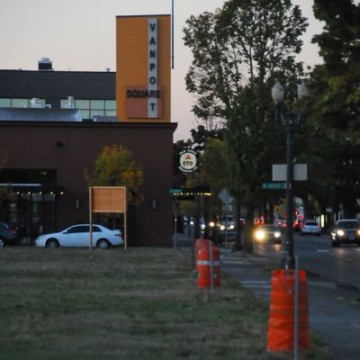Developer of Former Trade Joe’s Site Connected to California Corruption
Monday, October 20, 2014
Majestic Realty is developing a 20,000-square-foot shopping center at Alberta and NE Martin Luther King Jr. Streets
Majestic Realty Co. is developing a 20,000-square-foot shopping center with Natural Grocer as the anchor store at the intersection of Alberta and NE Martin Luther King Jr. Streets in Portland. The site sparked controversy earlier this year when the city struck a deal with Trader Joe’s to build a store there. Trader Joe’s eventually pulled out of the project after activists claimed the project would escalate gentrification in the traditionally black area.
The project is located in an urban renewal district meant to spur revitalization and assist low-income residents in the neighborhoods of the Albina Community. The special district means Majestic will get the land at a $2.4 million discount. The city eventually struck a deal with activists in the NAACP and The Portland African American Leadership Forum by committing $20 million to new affordable housing projects in the area.
Critics say the man behind Majestic, Edward Roski, Jr., who is part owner of the LA Kings and Lakers, has a history of close dealings with corrupt politics in Southern California.
Critics say they already feel like Majestic has swooped in, using its deep pockets and political might to get the development project, that should have gone to a local or minority business.
“I just think...they smoothed the right way and they greased the right pockets,” said Fred Stewart, a local estate agent. Stewart said the subsidies available in the neighborhood's urban renewal district should be used to help local African-American businesses, not a vast California developer. “It just shows you how nearly impossible it is for a black person to compete.”
Majestic Realty could not be reached for comment. City officials have said insiders deals are not as common in Portland as they are in other large cities. Officials insist they are transparent in their development dealings.
Political Persuasion
The history of insider dealings and powerful government persuasion begins with Majestic Realty President Edward Roski, Jr.
Roski is highlighted in several pages of Pulitzer-Prize-winning journalist Victor Valle’s book, City of Industry- Genealogies of Power. The book looks at the insider dealings and power that dominates the City of Industry, a suburb of Los Angeles, and how the municipality has, over time, become less of a town and more of a privatized corporate fiefdom.
The book describes a close working relationship Roski had with City of Industry Founder James Stafford. Stafford was convicted in 1984 for kickbacks and money laundering related to redevelopment projects. Roski was investigated by the FBI for his role as a board member of the Bank of Industry, a bank Stafford created. Roski was never charged, according to Valle’s book.
“For all intents and purposes, he had become Jim's paper son, the consummation of a bond that had taken decades to achieve and that transcended conventional definitions of blood inheritance,” Valle states in his book. “After all, he had maintained control over the body of Jim's private estate and continued to win [City of] Industry's biggest development projects, a clear indication that he had also inherited his mentor's influence in the city.”
The book focuses on a myriad of powerful industry leaders who have a long history of insider deals that helped them build their fortunes. Majestic, according to the book, now controls 27 percent of the all the land in the City of Industry.
“Industry's continuing privatization teaches lessons that transcend the specifics of Jim and Ed's relationship. It now seems unavoidably plausible that one corporation, rather than a handful, may control this tiny microstate state with a strategically big role in global trade,” Valle states in the book.
The book also details Roski’s role in unseating city councilor Patrick Perez, who opposed a hotel expansion plan of Roski's, and replacing him with Lawrence Mayo, who had worked for Stafford for 50 years.
Favors for insiders in the City of Industry are common, according to the book.
“The town has had a long tradition of manipulating the rules to benefit insiders, most notably Roski,” Valle states.
Moves in Portland

The city auditor’s office sent a letter to Majestic in February making them aware of rules requiring lobbyists to register, but Majestic never responded or registered, City Elections Officer Deborah Scroggin said.
Local neighborhood advocates and critics of the project have said they worry about big money flowing into Portland and the potential impact it could have on the political process. They say $100 is nothing compared to the thousands of dollars in campaign contributions Majestic has doled out in California and other states.
Stewart and other critics said they were concerned over Majestic's history, because for every insider deal that gets caught, many more probably go unseen.
"There’s a lot more dinners, there’s a lot more golfing, there’s a lot more everything that they didn’t get caught in," Stewart said.




Follow us on Pinterest Google + Facebook Twitter See It Read It